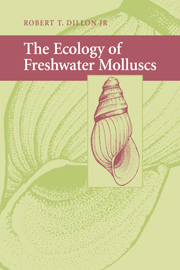6 - Parasitism
Published online by Cambridge University Press: 11 August 2009
Summary
The theme of this chapter is well summarized by the title of a collected volume edited by Toft and her colleagues (1991): ‘Parasite–host associations: coexistence or conflict?’. The answer to that question, over the entirety of biology, has proven quite complex. Here I examine a small, more easily tractible aspect of the problem, taking the perspective of freshwater molluscs.
Freshwater molluscs are known to host a wide variety of parasites. The first report of a haplosporidian from North America was Barrow's (1961) discovery in Michigan Lymnaea, Physa, and Helisoma. Haplosporidian disease subsequently decimated the oyster population on the east coast of North America, ending a way of life for thousands of fisherman. The oligochaete Chaetogaster lives on or in a wide variety of freshwater snails and may be parasitic (Buse 1971), commensal (Young 1974), or possibly even of some benefit to its host (Khalil 1961). This chapter will emphasize the Digenea, however, by virtue of the wealth of literature available. I conclude with brief discussions of two groups of parasites most associated with unionacean mussels, the aspidogastrid trematodes and unionicolid mites. Readers with interests in any other class of parasite to which molluscan flesh may be heir are referred to the primary literature directly.
The Digenea is by far the largest order of trematodes, that entirely parasitic class of flatworms generally termed ‘flukes’.
- Type
- Chapter
- Information
- The Ecology of Freshwater Molluscs , pp. 227 - 272Publisher: Cambridge University PressPrint publication year: 2000
- 1
- Cited by



